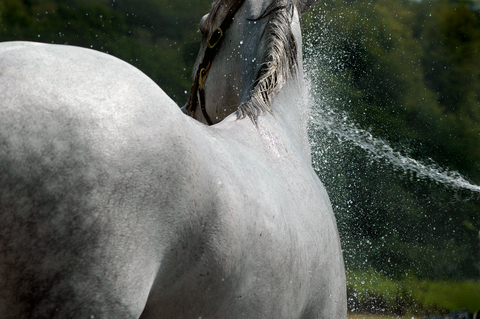Summer is a common time for heat-related issues but unexpected warm weather can add to overheating, especially if horses are out of shape and have long, thick coats.

Horse splashing drinking water on a hot day
You must provide extra care for your horse during hot weather to reduce stress and maintain health and well-being.
© 2008 by Louis New window.
Sweating is natural cooling
Horses normally cool themselves by sweating. The sweat evaporates from the skin surface and causes a cooling effect. Less sweat evaporates during times of high humidity. A horse that is working hard in a hot environment can lose 2 to 4 gallons of sweat per hour.
Horses can acclimate to hot and humid weather conditions. Air temperature and relative humidity affect the horse’s ability to cool itself.
The below guidelines can help reduce or avoid heat stress in horses.
How air temperature and relative humidity affect horse cooling
| Air temperature (F) + Relative humidity (%) | Horse cooling efficiency |
|---|---|
| Less than 130 | Most effective |
| 130-150 | Decreased |
| Greater than 150 | Greatly reduced |
| Greater than 180 | Condition can be fatal if the horse is stressed |
Keeping your horse cool
Overheating can result from:
- High humidity
- Poor barn ventilation
- Prolonged exposure to direct sunlight
- Excessive work
- Transportation
- Obesity
Here are some tips to keep your horse cool and comfortable during hot weather.
- Provide shade, airflow (use fans) and free access to clean water during hot weather.
- Avoid riding your horse when the combined air temperature (F) and relative humidity is over 150, especially if the horse is not acclimated to the heat.
- To cool an overheated horse, sponge it with cool water. Repeat this until the horse is cool.
- If near a water source, use a hose to spray the horse continuously with cool water.
- Contact your veterinarian right away if you suspect your horse is having a heat stroke.
Cooling an overheated horse
To cool an overheated horse (rectal temperatures above 103° F):
- Spray the horse’s head, back, neck, rump and legs with a steady stream of cool water.
- Repeat this continuously until the horse is cool.
- You can add ice to the water to speed-up cooling for very hot horses (rectal temperatures above 105 F).
- Research shows using ice to cool a hot horse is safe.
- Ice baths reduce core body temperature and lower heart rates after hard exercise.
- Horses were also found to trot more freely after an ice bath.
- Don’t directly apply ice water over the hind end (large gluteal muscles). Focus on areas where the blood vessels are more prominent: head, neck, back and rib area.
Don’t place a sheet or blanket on the horse when trying to cool it. Blanketing will block water evaporation from the skin. Don’t blanket during hot and humid conditions.
For additional information about caring for your horse during hot weather see complete article https://extension.umn.edu/horse-care-and-management/caring-horses-during-hot-weather
Note: Still timely article was first posted on EquiMed.com in July 2021
Press release by University of Minnesota Extension

